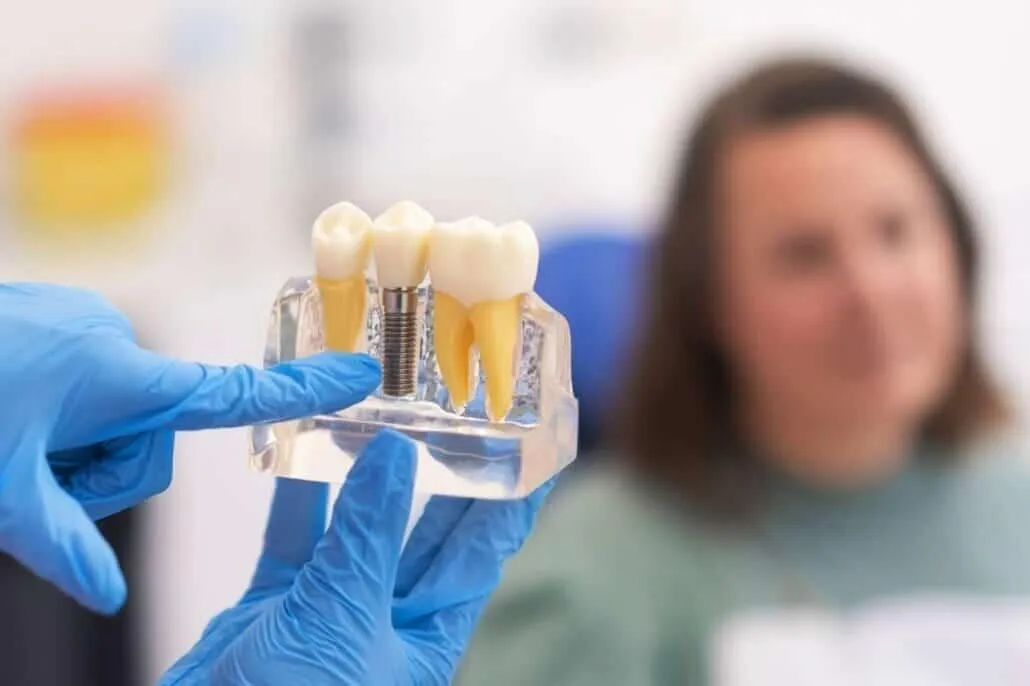
Blog

A Complete Guide to Dental Implants
Damaged, broken, and missing teeth can greatly affect your smile’s appearance. That can damage your self-confidence and make you reticent to do things you normally love to do. It can also affect your speech and chewing patterns. Dental implants can be a good solution for this problem.
Dental implants look and function just like your natural teeth, but are they right for you? To help you decide, we’ve created a complete guide to dental implants and why they might be a good choice.
Everything You Need to Know About Dental Implants
What is a Dental Implant?
A dental implant actually consists of three parts. The implant itself is the part that is surgically implanted into your jaw in place of your natural tooth’s root. The dental abutment (or connector piece) is then attached to the implant.
The abutment rises above the gum line and will be used to support the attached artificial tooth crown. The crown is the last part that is attached to the abutment.
Most dental implants are made of titanium or zirconium oxide. Dental implant crowns can be made from various materials, but tooth-colored zirconia (“porcelain”) is the most common.
What’s the Procedure for Getting an Implant?
Your dentist will usually begin by assessing your oral health and medical health to determine whether or not you are a good candidate for dental implants. They look at things like whether or not you have sufficient bone density to support the implant. If you don’t have enough bone density, your dentist may recommend a bone graft to make you eligible for the implant.
Once you are determined to be a good candidate, any remnants of the damaged tooth are extracted. Once the extraction has healed, your dentist will place the implant.
The goal is to have the titanium implant become integrated into your jawbone, a process called osseointegration. This will ensure the implant provides a solid base for your artificial tooth.
After osseointegration is complete, you will have a digital impression of the implant, and two weeks later your dentist will attach the crown, which is made to match the appearance of your natural teeth.
Are Dental Implants Better than Dentures?
It can be difficult to know if you should choose dental implants or dentures. In reality, that choice depends on a number of factors. Let’s look at what you should consider.
Attachment Forms
Because implants become part of your jaw, they stimulate your jaw in the same way that your natural teeth do. That can help prevent bone loss over time.
Dentures, on the other hand, don’t offer that level of stimulation.
Functionality
Dental implants can feel more like your natural teeth, and they are designed to function the same way. That can make speaking and eating much easier and more natural feeling than what you get with dentures.
Dental implants don’t need adjustments as they fit perfectly. Dentures, on the other hand, are often adjusted on a regular basis if there is a problem with the comfort level or fit.
Durability and Cost
While dental implants can fail for a variety of reasons, one study conducted in 2017 yielded a success rate after 10 years of between approximately 90 – 95%. That’s an excellent result, particularly given that success often depends on several factors that have little to do with the implant itself.
Dentures often need to be replaced every few years, and they can put stress on the supporting structures. However, dentures are usually less expensive than dental implants, although because they need frequent replacement, they may cost more over time.
How Do You Care for Dental Implants?
Caring for dental implants is similar to caring for your natural teeth. You will want to use a soft-bristled toothbrush to clean them at least twice a day. You’ll also want to use an interdental brush to get to those hard-to-reach areas. Most dental specialists also recommend using a waterpik to help remove debris. Flossing the implant is NOT recommended, as the floss may shred, forming a surface to which bacteria may adhere.
Just like with your natural teeth, problems can occur, particularly if you don’t care for your dental implants properly. If an implant becomes loose or the area around it shows signs of infection, you’ll want to see your dentist immediately.
Visit an Experienced Dentist in Richmond, VA for Dental Implants
If you’ve got questions or are looking for guidance on whether dental implants are a good choice for you, the professional team at the Cosmetic and Laser Dental Spa of Richmond will be happy to discuss your options so you can make the best choice for your oral health. Give us a call today!
VISIT US
27 Briggs Drive
Manakin-Sabot, VA 23103
Contact Us
Sarah C. Wilmer DDS, PLLC
(804) 784-2386
Business Hours
Monday: 8:00 AM - 5:00 PM
Tuesday: 7:00 AM - 4:00 PM
Wednesday 8:00 - 5:00 PM
Thursday 8:00 AM - 5:00 PM
Friday - By Special Appointment Only
Saturday & Sunday - Closed
Terms & Conditions | Privacy Policy
Copyright © 2024 | Cosmetic And Laser Laser Dental Spa Of Richmond | All Rights Reserved
